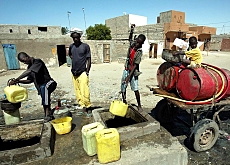Swiss told to wake up to urban reality

A travelling exhibition challenges the way the Swiss view their country, and calls for radical political and land-use reforms.
Switzerland is a city, “Metropoly” claims provocatively, with Geneva, Zurich and Basel as its neighbourhoods and the Alps as its Central Park.
The Switzerland portrayed in the exhibition currently in Basel is far from the most populous agglomeration in the world.
Its 7.4 million residents put it just behind London but well down the list from table leader, Tokyo, where 35 million people live within the city, its suburbs and satellite towns.
The aim of Metropole Switzerland, the think tank that organised the show, is to highlight the country’s urban character. Not four but 40 languages are spoken today in Switzerland, a small nation which is losing one square metre of land every second to development.
And like New Yorkers or Londoners, the Swiss are commuters, fleeing the city after work for homes in what they still perceive to be an idyllic countryside but which is increasingly an unplanned sprawl of new housing developments.
“We want to make the point that we have to build more densely in order to preserve whatever we can of our remaining green spaces,” explains Ursula Rellstab, the president of Metropole, a nationwide association consisting of architects, urban planners, politicians and journalists.
“We also have to do a better job integrating all of the people living in Switzerland so we don’t end up creating ghettos,” Rellstab told swissinfo. “And we need to reorganise our political system to reflect the realities of today.”
Car park
The location chosen for the first stop of the exhibition is as provocative as the content. It has taken over part of the upper deck of a three-story car park in an industrial zone straddling two cantons – Basel City and Basel Country.
The parking spaces have been covered with an artificial lawn. White picket fences divide the space into tiny gardens each focussing on a different theme. They are watched over by plastic gnomes.
Marc Keller, project leader of the Basel section of the exhibition, says Switzerland can overcome the borders represented by the fences if it has the will.
“Even though half of the Dreispitz [industrial zone] is in Basel City and the other half in Basel Country, it has been possible for the authorities of the two cantons to work together in order to plot its future course,” Keller says.
As a model for the entire country, the 50-hectare area will become multifunctional with parts clearly set aside for living, working, shopping and traffic. The renowned Basel architects, Herzog and de Meuron, have been commissioned to do the Dreispitz master plan.
Message
Metropole has been calling for reforms for years but for the first time the exhibition is delivering the think tank’s message to the general public. “We want to present the show in places where urban change is very visible,” Rellstab says.
“No-one dreaming of the country can build a good city,” is one of the exhibition slogans. However Rellstab does not think Switzerland is moving in the wrong direction. She says the show should only serve as a wake up call for large parts of the population still caught up in the nostalgic past.
Metropole wants radical changes to a current political system where much of the power lies with the country’s 26 cantonal governments and 2,842 town councils, which were created in an age when most Swiss never ventured far from their place of birth.
For example, even though residents of both Basel cantons use each other’s infrastructure, work in each other’s offices and eat and drink in each other’s restaurants and bars, they have separate school boards, hospitals and rates of taxation.
It can make for great disparities. As Metropole illustrates, the government in one spends six times more per capita on health and culture than the other.
“The urbanisation of Switzerland cannot be stopped but it can be guided,” Metropole warns.
swissinfo, Dale Bechtel in Basel
The concept for the show has been developed by Metropole, a liberal think-tank set up in 1994.
The Metropoly exhibition runs in Basel until September 1.
It will then make stops in the following places:
Romanshorn, September 7-16
Meyrin (Geneva), October 5-18
Delémont, October 23-31
Rapperswil, November 6-11
Pfäffikon, November 13-18
Rüti (Zurich), November 20-24
Lugano, December 4-11
Country size: 41,285 km²
Population: 7.4 million
21% of residents are foreigners
People from 194 nations make up Switzerland’s foreign population
Average area of living space claimed by each resident: 48m²

In compliance with the JTI standards
More: SWI swissinfo.ch certified by the Journalism Trust Initiative












You can find an overview of ongoing debates with our journalists here . Please join us!
If you want to start a conversation about a topic raised in this article or want to report factual errors, email us at english@swissinfo.ch.